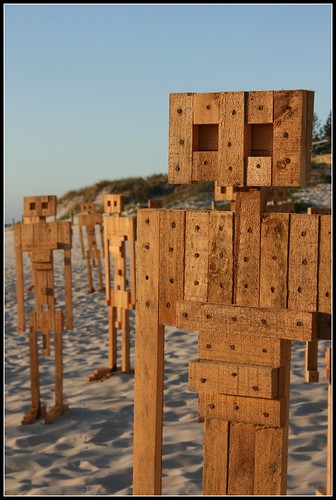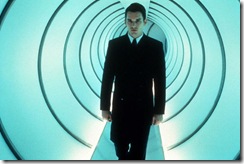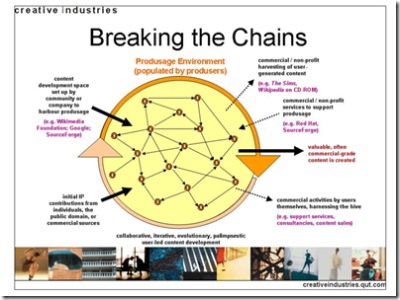Home » Perth (Page 3)
Category Archives: Perth
Sculpture by the Sea – Cottesloe 2008
Last night Emily and I enjoyed the 2008 installations for Sculpture by the Sea which is in its final few days this year. For those of you unfamiliar, this wonderful annual effort sees one of Perth’s best beaches suddenly populated with all manner of installation art and sculptures for a couple of weeks – it’s always a great event which really does mix art and beach culture in a really engaging way. While I didn’t take that many pictures list year (unlike 2007 where I went a little nuts!), you can find a few more photos of this years sculptures on Flickr.
Anyone in Perth who hasn’t made it down to Cottesloe yet, tomorrow (18 March) is the last official day, so get your skates on!
UWA Science Fiction/Fantasy Discussion Group
For any interested Perth folk, a SF/F discussion group re-emerges:
After a long hiatus, the UWA science fiction/fantasy discussion group is restarting in 2008. Meetings will be held on the last Tuesday of each month in Arts G.05, and undergraduate students, postgraduate students, staff and anyone else interested are welcome to attend.
We have two speakers presenting papers in the next two weeks, but are looking for volunteers to fill the rest of the year. Please contact Karen Hall if you would like to give a paper.
26 February (Next Tuesday)
Gotham Central
Presented by David Medlen
A short lived award winning comic set in the world of superheroes but not about superheroes. What does this short lived title tell us about the genre in the 21st Century? A summary of the comic is available at http://en.wikipedia.org/wiki/Gotham_Central, and source material will be available in the Scholars Centre at UWA’s Reid Library.4 March
“Against heritage: Invented identities in science fiction film”
Presented by Dr Sky Marsen, Victoria University of Wellington
Pre-reading material for this talk is available from Karen Hall.
Podcamp Perth Wrapup
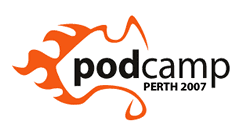
Last weekend was Australia’s first Podcamp, right here in Perth. It was pretty good with an engaging mix of tech, talk and interesting folks. I don’t have time to hunt down all the many, many blogposts and photos from Podcamp, but Simone van Hattem links to most of them in her blog, or else you can check Technorati or Flickr. I was intending to add audio to my presentation slides, but the audio didn’t quite eventuate. However, Stewart Greenhill did an excellent job capturing video of many of the Podcamp sessions, and so if anyone wants to hear the session on Podcasting in Education which was led by Sue Waters and I, here you go:
(Yes, I do use a lot of gestures!)
For those who prefer a static image, here’s one picture of me attempting a ‘Presentation 2.0’ style of slides mainly because I wanted to try something a bit different (but also to keep my co-presenter Sue happy):
I also rather like this photo, of white and black Macs at play:
(Photos by CW.)
PS Yes, it’s October 31st, but, no, most Australian don’t celebrate Halloween. However, if we did, I’d definitely give the most candy to anyone who knocked on my door who was geeky enough to be wearing this.
Podcamp Perth
So, as I’m sure you remember, Australia’s first Podcamp happens today in Perth. It’s a free event and is held at Central TAFE in East Perth, so if you’re just remembering now, please still feel free to come along! Sue Waters and I are facilitating a session on Podcasting in/as Education at some point during the day (we sort the actual schedule out first thing in the morning). Here and the few slides I’ll be using:
 | View | Upload your own
| View | Upload your own
There aren’t that many slides, as the whole point of an unconference is that everyone participates, so the sessions should be a lot more like a conversation that just presentations. My understanding is that the short presentation bits are really to help focus the conversation, not dominate it.
To check in on the blogging and podcasting during the day, and afterwards, watch the tag “podcampperth07“.
perthDAC – The 2007 DAC – Wrap-up Post
The DAC (Digital Arts and Culture) conference was in Perth last week and I was lucky enough to be able to attend perthDAC in all its glory. It was the first time DAC has been held in Perth, and only the second time it’s been in Australia; and at the outset, a huge congratulations must go to conference organiser Andrew Hutchinson who ran a very well-oiled event and brought some an amazing intellectual and social extravaganza to our little city. There were so many engaging and exciting ideas and papers floating around that I’ll never do justice to them in one post, but I thought I’d mention a few things and papers that really stood out for me. That said, if you’re after a robust blogging of perthDAC, check out Axel Bruns’ posts which capture the vast majority of the conference. (I’m starting to think Axel should be up for some sort of prize; he’s without a doubt the world’s most thorough conference blogger, conscientiously acting as a collective scribe whose records prove extremely valuable for giving overviews of conferences and keeping in focus some of those details which when not recorded in the instant tend to get lost in the ebb and flow of conferencedom.)
[X] Christy Dena, “The Future of Digital Media is all in Your Head: An Argument for the Age of Integration” – While perhaps less an argument than a snapshot of the present and the trends being laid bare for the future of media, Christy’s paper illustrated the incredibly rich media world we’re all currently living in. More to the point, in looking at Cross-Media, Transmedia and many other points where media is literally crossing medium boundaries (as the plurality of the term has always implied), Christy ended with the salient point that, in assessing the future of digital media, one core point is that it certainly won’t be just digital! Indeed, the future of all media really stands at points of intersection and potential integration of all media in various complex ways. (This point, incidentally, was powerfully reinforced by Stewart Woods whose paper – “Last Man Standing: Elimination and Risk in Social Game Play” – argued that games studies really still needs to keep looking at the social complexities of physical and board-game play which really haven’t been fully explored in the algorithmically bound play of digital videogames.)
[X] Mark McGuire, “Virtual Communities and Podcasting: the emergence and transformation of public electronic space” – Mark used the work of Jurgen Habermas on the public sphere and combined it with a solid overview of internet communities (like the WELL) and community-practices (such as those encouraged and facilitated by Amazon.com) to interrogate the relatively new history of podcasting. The shift from the utopian ideals of Dave Winer (and to a lesser extend Adam Curry) to the commercialisation of podcasting – in terms of accessibility and distribution, if not creation – is seen as another instance where community-led ideals and interaction are undermined by a lack of public ownership and public institutions (exemplified by Apple’s commercial iTunes Store becoming the default podcasting directory, and thus major podcasting portal).
[X] Axel Bruns, “The Future is User-Led: The Path towards Widespread Produsage” – Axel has been sharing his work on ‘produsers’ (producer/users) for some time now, but each time I hear or read his work, I’m impressed by how carefully situated it is. While produsers are clearly part of the same realm as participatory culture and citizen journalism, Axel takes great care in showing that a change in the modes of production and consumption in the era of networked communication and distribution (the core of the produser) has great social and democratic potential, but is sure to acknowledge that produsage still needs political drivers in order to avoid being co-opted (Amazon.com is a great example of produsage, but the social networks and user-generated content on their website is clearly working in financial terms primarily for Amazon). One slide Axel showed which I thought summarised his take well was a fairly complex dynamic which showed culture in the double sense of both our world and of a scientific Petri Dish in which something is refined and grown before it becomes fully realised and useful for the real world:
You can read Axel’s full paper and get the full set of PowerPoint slides over at his blog; I can’t wait for the book! (On another note, I didn’t manage to convince Axel of Twitter’s value – not for lack of trying – but we did chat about the Mashedlc project which I’m very interested in and think it could be of very real value for educators using web2.0 tools in their teaching.)
[X] Jill Walker Rettberg, “Blogs, Literacies and the Collapse of Public and Private” – In a nutshell, Jill argued that while traditional (print) literacies was part of the reification of a divide between public and private, newer digital (network) literacies are leading to the blurring, or even collapse, of that neat binary division. Of course, many cultural commentators and others have vested interests in the public/private divide, and the blogging ethos or every reader potentially being a writer has produced something of a backlash (albeit as much due to skepticism of the shift rather than a deeper engagement with it). Jill and Axel’s papers had a lovely symmetry, both arguing for new ways of conceptualising fair traditional things on the back of the shifts toward a more meaningful participatory culture. Jill’s paper is also part of an upcoming work, her Blogging book due from Polity Press next year. I think that, too, is well worth watching for.
While I shan’t go into any depth, DAC also had quite a few papers on games (both digital and otherwise) which I really enjoyed and, for a game studies novice like myself, game a very accessible overview to current trends. The two stand-out papers for me were Torill Mortensen’s, which looked to synthesize the current multiple directions of games research into a menaingful single framework, and a paper by Nick Montfort and Ian Bogost (delivered by Fox Harrell) which looked at the idea of Platform Studies which explores the way actual game platforms influenced the design, agenda and possibility for game play and game design. Another exciting area were papers from Lisbeth Klastrup and Larrisa Hjorth (the later of which was presented by Christy Dena) both looked in depth at mobile phone culture in relation to community-building and story-telling respectively (although obviously with large points of intersection).
Outside of the formal academic papers, two things about DAC really stood out: it’s as much a community as a conference, and it’s heavily invested in maintain connections with art and pratice beyond the formally academic. Case in point: this year’s DAC was perfectly integrated with the larger BEAP and as part of DAC we visited I took a deep breath…, Impermanence (PDF), Still, Living (PDF) and other exhibitions, complete with artist and curator talks. This, mixed with DAC’s informal performance night, meant that broader discussions art, digital media and interaction, were focused through shared experiences and provocative installations. On the social side, DAC folk combine intellectually exciting and socially engaging in impressive proportions! In that spirit, I took a few photos which are in a perthDAC Flickr set and Lisbeth Klastrup has posted a DAC 2007 photo set, too. Of course, the thing that everyone really wants to know is who’s the best DAC dancer, and, somewhat surprisingly, thanks for Scott Rettberg (part of the GTA team), we now know:
Fox Harrell is an excellent dancer, and Mary Flanagan does some amazing hyperkinetic lawnmower-and-grocery-shopping-moves. Lisbeth Klastrup was clearly the most agile of the Scandinavians, though Jaakko was nearly as fluid and he won the prize for the coolest T-Shirt — the “conference moderator” shirt with the built-in-clock. I was shuffling at about an equivalent level to Raine Koskimaa, average Finnish dancer.
Follow Scott’s post back for a cameraphone video capturing the DAC dance action (and, no, I’m not there on the dance floor you’ll be relived to hear).
Finally, here’s a picture of Mary Flanagan from Lisbeth’s set, reminding us all to be there for DAC 2009 …
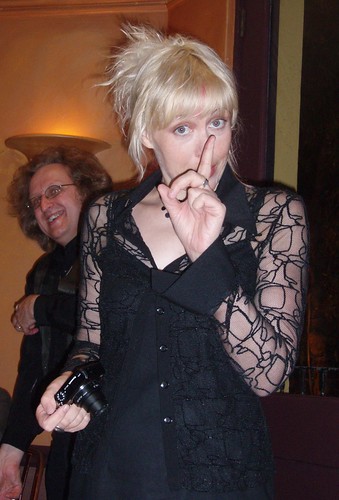
State of the Art: Science Fiction Histories (Perth, Western Australia, 22 & 23 March 2008)
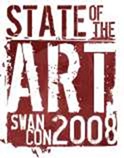 CALL FOR PAPERS – STATE OF THE ART: SCIENCE FICTION HISTORIES
CALL FOR PAPERS – STATE OF THE ART: SCIENCE FICTION HISTORIES
Perth, Western Australia, 22nd-23rd March 2008
In his recent history of the genre, Roger Luckhurst argues that the marginalisation of Science Fiction (SF) from the literary establishment helped readers and writers to identify its conventions. Fandom blossomed from this liminal space, its culture providing a unique history of the relations between texts and their readers. While fans were the first historians of SF, other communities have since established their own versions of the genre. The rise of national SF in countries such as Brazil and the old Soviet Union, China and Japan de-centre its Anglo-American bias. Feminist and queer writers work to unravel its phallocentrism and heterosexism. Histories of black and Aboriginalist fiction point out the political uses of the form. The genre has itself been shaped by its reception by these communities. In Anglo-American SF, the genre’s intimacy with fandom has transformed the way its fiction (and history) has been written. It is with a view to thinking through such developments that this symposium seeks work on what SF has been to different audiences at different times, on rewriting generic history to arrive at a better understanding of the state of the art today.
Papers are invited on the following or related topics:
[X] Histories of the SF community
[X] Intersections and interactions between fan and popular cultures, and between fandom and the general public.
[X] Political histories in SF, such as Marxist, anarcho-capitalist, etc
[X] Intersection of SF with feminist & queer theories
[X] Postcolonial approaches to SF
[X] National histories of SF
[X] Non-Anglo-American traditions of SF
[X] History of race in SF
[X] The collapse of genre: slipstream, new weird, etc
Sponsored by Curtin University of Technology, the symposium will be held as part of State of the Art: Swancon 2008, the National Australian convention of science fiction, fantasy and horror.
SPEAKERS
Swancon 33 guests of honour are:
[X] Ken McLeod (Scotland)
[X] Paul Cornell (UK)
[X] Glenda Larke
[X] Zara Baxter
Confirmed Speakers for the Symposium are:
[X] Mark Bould (The University of the West of England)
[X] Andrew Milner (Monash University)
[X] Sylvia Kelso (James Cook University)
[X] Stephen Dedman (University of W.A.)
SUBMISSIONS
Submissions are sought for both individual papers and panel presentations.
Papers –submit 300-500 word abstract
Panels – submit 300 word description of the panel theme and short abstracts / details of panel participants
PUBLICATION OF PAPERS
Selected papers from the symposium will be published in a special journal issue. To be considered for publication, draft papers must be submitted before the symposium.
DEADLINES
Abstracts due: December 7. 2007
Draft papers (for publication) due: March 14, 2008
CONTACTS
Sonia Marcon, Swancon Academic Stream
Darren Jorgensen, Media, Society & Culture, Curtin University of Technology
Helen Merrick, Media, Society & Culture, Curtin University of Technology
Email: sciencefictionhistories@gmail.com
Website: http://www.swancon.com/
